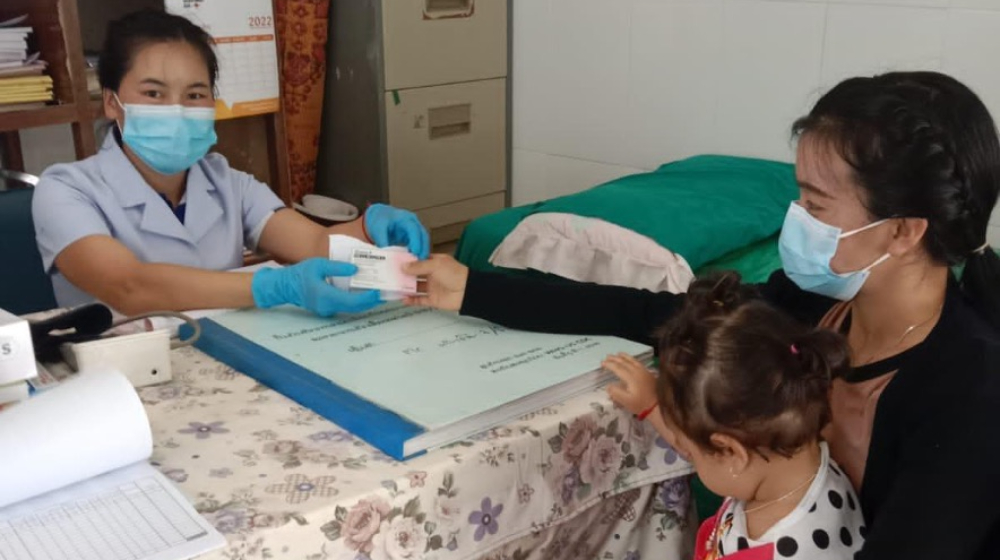News
In Lao PDR, midwives provide life-saving and culturally competent care to the country’s ethnic communities
- 22 September 2022
News
LONG DISTRICT, Lao People’s Democratic Republic – “In the past, Akha women gave birth without assistance and did not come to health centres. Most of the pregnancies were unsafe,” says 28-year-old midwife Vida Jepeu.
Ms. Jepeu is a member of the Akha ethnic group, which makes up less than 2 per cent of Lao PDR’s population of 7.4 million. Based out of Long District Hospital in Luang Namtha Province, Ms. Jepeu graduated from a UNFPA-supported midwifery programme in 2017.
As an Akha midwife, Ms. Jepeu joins a growing number of providers in Lao PDR combining world-class training and cultural insights to serve women from the country’s dozens of ethnic communities – many of whom historically faced maternal health risks due in part to the prevalence of home births.
According to the 2017 Lao Social Indicator Survey, more than one-third of births in Lao PDR happen without the support of a skilled health provider, reflecting both the pervasiveness of traditional birthing practices as well as continued obstacles to accessing care at health facilities. Many live far from health centres, or lack transport to get to them. Language barriers and cost also serve as deterrents.
“I encourage women to give birth at health facilities to keep mothers and babies safe,” Ms. Jepeu says.
Births without the assistance of qualified health-care professionals put women at risk of deadly complications. An estimated 185 mothers die per 100,000 live births in Lao PDR – the fourth-highest such rate in the Asia-Pacific region.
Well-trained midwives can help avoid about two-thirds of maternal and newborn deaths, according to the 2021 State of the World’s Midwifery report. Unfortunately, in Lao PDR, as in many other countries around the globe, midwives are in limited supply.
UNFPA Executive Director Dr. Natalia Kanem spoke to midwives’ essential role in society – and their scarcity – at a side event to the 77th UN General Assembly, PUSH at UNGA: Bringing together global feminist leaders to envision a world with more midwives, on 18 September.
“Let’s close the midwifery gap and build a strong global reproductive health workforce — adding one million more midwives,” she urged.

Midwives save lives
Despite the challenges, the presence of women like Ms. Jepeu represents major progress. In 2007, there were just 100 midwives working in Lao PDR, according to Ministry of Health data.
UNFPA has been working with the government to support the training and deployment of midwives across the country – especially to rural areas, where two thirds of the population resides. This partnership has led to the establishment of a workforce of over 1,800 midwives operating nationwide in 2020.
These efforts have contributed to significant improvements in women’s and mother’s health. Lao PDR’s maternal mortality ratio declined from 357 deaths per 100,000 live births in 2012 to 185 deaths per 100,000 live births in 2017.
Delivering more than safe births
And midwives do far more than assist pregnant women with labour.
Ms. Jepeu, for instance, partners with district teams to conduct outreach in the villages surrounding Long District Hospital, raising awareness on topics like contraceptives and antenatal care and countering harmful norms – such as the belief that giving birth to twins is bad luck.
Along with other midwives from Lao PDR’s minority ethnic groups – some of whom have returned to their home villages to practice – Ms. Jepeu shares her expertise while keeping their community’s unique circumstances in mind.
“I encourage Akha women to breastfeed for at least six months,” she says, noting many had been reluctant to do so in the past due to the challenge of balancing the practice with other responsibilities, such as farming.
When difficult cases arise, they can connect via helpline to discuss and develop response strategies. This approach has helped bridge the gap between Ms. Jepeu’s community and maternal health care services – overcoming an often formidable language barrier.
“Since we have Akha midwives, Akha clients are comfortable to come and seek support,” Ms. Jepeu says. “The proudest moment for me is seeing women give birth at a health facility assisted by qualified health personnel, so they don’t suffer any complications.”